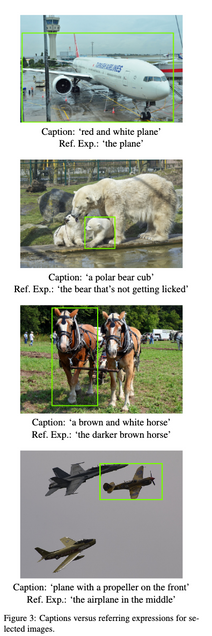News
Exciting things are always afoot.
SALT 2021 talk: Challenge problems for a theory of degree multiplication (with partial answer key)
Elizabeth Coppock presented a talk entitled "Challenge problems for a theory of degree multiplication (with partial answer key)" at SALT 2021.
Slides here: http://eecoppock.info/coppock-salt2021-slides.pdf
SALT 2021 talk: Granularity in the semantics of comparison
Helena Aparicio, Curtis Chen, Roger Levy, and Elizabeth Coppock presented a talk entitled "Granularity in the semantics of comparison" at SALT 2021. Abstract here: https://osf.io/9z54r/
Summer UROP award to James Cooper Roberts
James Cooper Roberts has been awarded a summer UROP fellowship, to work on the project of automatically generating referring expressions for objects in complex scenes. He will be developing an annotated corpus. Welcome!
Ying Gong & Elizabeth Coppock present at LSA!
Ying Gong and Elizabeth Coppock presented a talk entitled "Mandarin has degree abstraction after all" at the LSA in January 2021.
If you missed it, don't worry -- you can watch it here!
http://eecoppock.info/LSA-Ying+Liz.mp4
And here are the slides:
http://eecoppock.info/Ying+Coppock-LSA2021Slides-Mandarin_Degree_Abstraction.pdf
Probability and Meaning 2020
 We gave a talk at the Probability and Meaning conference, hosted by the University of Gothenburg in October 2020. In this talk, we undertake a side-by-side comparison between image captioning and reference game human datasets and show that they differ systematically with respect to informativity.
We gave a talk at the Probability and Meaning conference, hosted by the University of Gothenburg in October 2020. In this talk, we undertake a side-by-side comparison between image captioning and reference game human datasets and show that they differ systematically with respect to informativity.
The related paper can be found here:
https://www.aclweb.org/anthology/2020.pam-1.14.pdf
It can be cited as:
Coppock, Elizabeth, Danielle Dionne, Nathanial Graham, Elias Ganem, Shijie Zhao, Shawn Lin, Wenxing Liu and Derry Wijaya (2020). Informativity in Image Captions vs. Referring Expressions. In C. Howes, S. Chatzikyriakidis, A. Ek and V. Somashekarappa (eds.): PAM 2020: Proceedings of the Conference on Probability and Meaning, pp. 104–108.
Published in Language!
An article entitled “Universals in Superlative Semantics” by Elizabeth Coppock, Elizabeth Bogal-Allbritten, and Golsa Nouri-Hosseini has been published in Language, the official journal of the Linguistic Society of America! Click here to read it.
Abstract:
This article reports on the results of a broad crosslinguistic study on the semantics of quantity words such as many in the superlative (e.g. most). While some languages use such a form to express both a relative reading (as in Gloria has visited the most continents) and a proportional reading (as in Gloria has visited most continents), the vast majority do not allow the latter, though all allow the former. It is argued that a degree-quantifier analysis of quantity words is best suited to explain why proportional readings typically do not arise for quantity superlatives. Based on morphosyntactic evidence, two alternative diachronic pathways through which proportional quantifiers may develop from quantity superlatives are identified.
Ying Gong presents at LFRG
On Wednesday, September 23rd, Ying Gong presented her work in progress on degree abstraction in Mandarin at LFRG (LF Reading Group) at MIT.
Abstract: According to Beck et al. (2004), not all languages with degree predicates have degree abstraction. A language with a negative setting of their degree abstraction parameter (DAP) is one in which degree variables cannot be bound in the syntax. Mandarin, along with Japanese, Yoruba, Mòoré, and Samoan, is argued to be a [-DAP] language with degree predicates Beck et al. (2010). Recent work, however, has argued for degree abstraction in Japanese (Shimoyama, 2012; Sudo, 2015), and Yoruba (Howell, 2013). We argue that Mandarin has degree abstraction too, contraKrasikova (2008), Beck et al. (2010) and Erlewine (2018). We rebut the previous arguments and present positive evidence from degree questions, wh-correlatives (subequatives), scope interactions with modals (exactly-differentials and little-sentences), and attributive comparatives.
Prof. Coppock receives UROP Outstanding Mentor Award
Prof. Elizabeth Coppock was honored to win a UROP Outstanding Mentor Award for Summer 2020!
Poster to be presented at Experiments in Linguistic Meaning (ELM)
Danielle Dionne wins ‘Best Lightning Talk’ at WeSSLLI!!
Huge congratulations to Ph.D. student Danielle Dionne, who won 'Best Lightning Talk' at the Web Summer School in Logic, Language and Information (hosted by Brandeis this summer, in lieu of NASSLLI). She presented her research on cross-linguistic variation in pragmatics, focussing on what happens when one language lacks a simple, one-word equivalent for a single word in another language.
We are incredibly proud of her for this fantastic achievement!